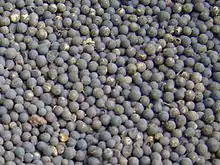Embelia ribes
Embelia ribes, commonly known as false black pepper, white-flowered embelia, vidanga, vaividang, vai vidang, or vavding,[1] is a species in the family Primulaceae. It was originally described by Nicolaas Laurens Burman in his 1768 publication, Flora Indica.[2] It is widely distributed throughout India. In Ayurveda and Siddha, it is considered widely beneficial in variety of diseases[3] In particular embelin isolated from dried berries of Embelia ribes has a wide spectrum of biological activities.
| Embelia ribes | |
|---|---|
 | |
| Embelia ribes seeds | |
| Scientific classification | |
| Kingdom: | Plantae |
| Clade: | Tracheophytes |
| Clade: | Angiosperms |
| Clade: | Eudicots |
| Clade: | Asterids |
| Order: | Ericales |
| Family: | Primulaceae |
| Genus: | Embelia |
| Species: | E. ribes |
| Binomial name | |
| Embelia ribes | |
References
- "Sorting Embelia names". Multilingual Multiscript Plant Database. The University of Melbourne. Retrieved 2009-08-11.
- "Embelia ribes". International Plant Names Index (IPNI). Royal Botanic Gardens, Kew. Retrieved 13 October 2009.
- http://results2.ap.nic.in/general/plants/plshow.jsp?scode=1084&pln=VIDANGA%5B%5D
External links
- Jalalpure SS; Alagawadi KR; Mahajanashetti, Shah BN; Salahuddin; Singh V; Patil J.K, In Vitro Anthelmintic Property of Various Seeds Oils Against Pheritima posthuma, Indian Journal of Pharmaceutical Sciences. 2007 Jan-Feb; 69(1): 158-0
- Caldecott, Todd (2006). Ayurveda: The Divine Science of Life. Elsevier/Mosby. ISBN 0-7234-3410-7. Contains a detailed monograph on Embelia ribes (Vidanga), as well as a discussion of health benefits and usage in clinical practice. Available online at https://web.archive.org/web/20120620164521/http://www.toddcaldecott.com/index.php/herbs/learning-herbs/343-vidanga
This article is issued from Wikipedia. The text is licensed under Creative Commons - Attribution - Sharealike. Additional terms may apply for the media files.